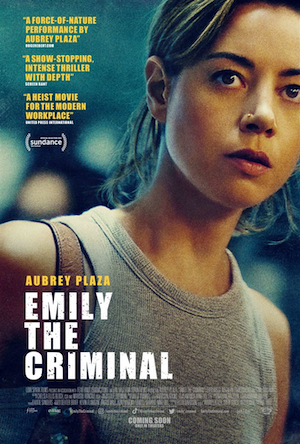 Aubrey Plaza is funny. I first saw her in FUNNY PEOPLE, and then I knew her for years as April on Parks & Recreation. She seems hip for a sitcom star, and for a decade and a half has been able to oscillate between mainstream comedies and indie movies. The one that gave me a new level of respect for her was INGRID GOES WEST (2017), a dark squirm-inducer where her titular character moves to L.A. to try to become friends with her favorite Instagram influencer. It’s a very layered character and performance, but it’s a funny one. She’s funny.
Aubrey Plaza is funny. I first saw her in FUNNY PEOPLE, and then I knew her for years as April on Parks & Recreation. She seems hip for a sitcom star, and for a decade and a half has been able to oscillate between mainstream comedies and indie movies. The one that gave me a new level of respect for her was INGRID GOES WEST (2017), a dark squirm-inducer where her titular character moves to L.A. to try to become friends with her favorite Instagram influencer. It’s a very layered character and performance, but it’s a funny one. She’s funny.
What’s surprising about Plaza in EMILY THE CRIMINAL is that she’s completely engrossing without being funny at all. She makes one or two bitter jokes, but this is a gritty, very grounded crime drama. Those withering looks of disgust she gave as sullen teen April Ludgate have evolved into more mature and considered looks of contempt for the system, and humanity, and all this bullshit.
Plaza (CHILD’S PLAY) plays Emily Benetto, a New Jersey-ite living in L.A., working long hours delivering food for a catering service, sharing a small apartment with a bunch of roommates, trying to find a better job to pay off her crushing student loan debt. This is complicated by a felony conviction for aggravated assault. We learn a little more about that later, but at first it’s something we just have to hear about her and wonder about, and still accept her for who she seems to be now, as an employer would have to.
 We see Emily drawing sometimes, and then learn through her old friend Liz (Megalyn Echikunwoke, “Pretty Reporter,” A GOOD DAY TO DIE HARD) that she used to paint portraits but hasn’t done it in a while. Painting makes her happy, but she doesn’t have the time or energy to do something just to make herself happy. She and Liz went to high school together and then went to art school together and then moved to L.A. together, so Liz kind of represents what Emily’s life was maybe supposed to be at this point. Liz works at a big advertising agency and often talks about hooking Emily up when there’s an opening, but they both seem nervous about what the boss will think about her recommending someone with a record.
We see Emily drawing sometimes, and then learn through her old friend Liz (Megalyn Echikunwoke, “Pretty Reporter,” A GOOD DAY TO DIE HARD) that she used to paint portraits but hasn’t done it in a while. Painting makes her happy, but she doesn’t have the time or energy to do something just to make herself happy. She and Liz went to high school together and then went to art school together and then moved to L.A. together, so Liz kind of represents what Emily’s life was maybe supposed to be at this point. Liz works at a big advertising agency and often talks about hooking Emily up when there’s an opening, but they both seem nervous about what the boss will think about her recommending someone with a record.
The title describes not only her past, but a new opportunity that comes up. A co-worker at the catering place gives her a number to text, saying she can make $200 in an hour. She goes to a warehouse where they scan her driver’s license and send her into an orientation led by Youcef Haddad (Theo Rossi, CLOVERFIELD), explaining that the gig is as “dummy shoppers.” He says yes it’s illegal, no, no one will be hurt, if you’re not comfortable with it, leave now. She almost does leave, but he sweet talks her. The job is just to go to Target or somewhere like that and buy a TV with a fake credit card and ID. She does it, gets her 200 bucks cash in an envelope, and Youcef says she’ll be contacted if she wants to do one that gets her $2000. A riskier one, but he says it’s safe.
I like this sort of story, maybe because we don’t see all that many of them – the crime movies that go into detail about very small time crime. I’m not saying I did a great job, but I tried to kinda do that in my book Niketown, centering it around a heist of limited edition Nikes. Here there’s a bunch of money involved, but it’s unglamorous compared to standard movie crime. No cartels or crime lords with mansions and Lamborghinis. No guns, even. The primary weapons are a taser and a box cutter, the fights are messy and ugly, the photography is raw, handheld, lots of tight closeups on her face. So it really puts you in her perspective as she’s doing things like try to leave before a credit check goes through, and gives you so much more dread and tension than some of the more fanciful cinematic crime depictions.
Emily feels very real, and I think I can relate to a few small parts of her, but what makes her an exciting character is how much she’s not like me. Her super power is being too fed up to take any shit anymore. At the point where others back away, she rises up. There’s a thrilling scene that reminds of that part in THE LIMEY where he gets his ass kicked and is literally thrown out of the building and I think well, time to go home, regroup and— but before I’ve finished the thought he gets up and goes back into the building. Emily is attacked and robbed in her own apartment. She survives and locks the door and cries, having been degraded and threatened, having lost everything she’s been working for. I’m thinking what can she even do now, how can she start over, knowing it could all be wiped away again like this? But then she says fuck this, gets up, unlocks the door and goes out to the street to continue the battle.
I love the scenes like that, but two of the most gut-wrenching parts don’t involve any danger at all – she’s just doing job interviews. In the opening she sits in a cubicle answering questions about her record for someone who already knows the answers, later she faces a different type of difficulty. In both cases she starts out being polite and trying to say what she’s supposed to say, but suddenly decides fuck this and gives the interviewer what for. Verbally handling them the way she physically deals with violent attackers.
We’re trained by other crime tales to fear Youcef and assume his kindness to Emily is an act of manipulation. But it turns out he really doesn’t force anybody to work for him, really does feel bad about her getting a bloody nose during her second job, and really does like her. What humanizes him most is when he brings Emily to meet his mom (Sheila Korsi, THE TAX COLLECTOR), who he’s trying to impress. Clearly the real threat is his partner and cousin Khalil (Jonathan Avigdori, MUNICH), who gets suspicious about Youcef hanging out with one of their dummy shoppers.
This is about class and labor and capitalism, not in the sense of an allegory or a highfalutin message movie, but in the sense that life is often about those things. Emily can carry food into a conference room and have no one look at her, she can stare down a man much bigger than her until he stops trying to intimidate her, she can put on a nice dress and meet her friend at an overpriced bar. It’s a sort of code switching between work life and hanging out with Liz, and there’s a question of which she’d rather be. Doing this fraud shit (and still doing the catering!) seems very stressful, but when she gets an opportunity to maybe get a straight job like she wanted before it almost seems like a betrayal. Are you really gonna go back to your old dreams? When she goes to a party with all of Liz’s work friends you’re not sure how much she wants to be around people like that. There’s a great awkward “so I hear you’re an artist?” conversation where she’s asked what she does, she considers her options and then just says the truth: “Credit card fraud.” I assume they took it as a joke, but the response is left unseen.
ENDING SPOILERS THIS PARAGRAPH ONLY. That all plays into the ending, which is dark in a way I wasn’t prepared for. Things come disastrously to a head, there is confrontation and violence, but when all is said and done she slips away with the loot. In an epilogue we see her on a beach in South America, which was always her dream, and also the standard happy ending we expected, the protagonist who got away with the money and can live a nice life now. Or so it seems. But then we see her in a warehouse introducing a group of new recruits to the same credit card scam Youcef did, giving his speech pretty much exactly (but in Spanish). We don’t know precisely what her situation is – she presumably can’t return to the U.S., I don’t know if she can use her real name or what. But the implication is that either stealing all that money still wasn’t enough to start a comfortable life, or (more likely and more troubling) she decided this was what she wanted to do anyway. She’s good at it and she likes it. And I doubt she’s gone back to painting, even if she has time. Bleak.
I would like to mention the score by Noah Halpern (WATCHER), which involves some cool beats, and definitely adds to the mood of the movie. Director of photography Jeff Bierman also seems like an important contributor. His background is mainly in shorts and music videos (Ciara, Ariana Grande, Lenny Kravitz, Alicia Keyes, A$AP Ferg) but the approach here is raw and natural, not slick.
After watching this I was thinking Plaza would probly impress a bunch of big directors and get some big roles off of it, and maybe she already has – she’s in Francis Ford Coppola’s MEGALOPOLIS. Paul Schrader posted that EMILY THE CRIMINAL was “an impressive feature debut! Assured, smart, constantly pushing the narrative,” after initially confusing it with Emily in Paris. It doesn’t seem like wannabe Schrader or anything but I see a strong parallel there in the way it gives a very real-feeling journey through an underworld I hadn’t given much thought to, with a really compelling, complicated protagonist who’s neither a good guy or a bad guy. Just a person.
One difference is in the pacing – it’s a 93 minute movie with a bunch of turbo boosts through the narrative that really give it momentum. It’s the feature debut of writer/director John Patton Ford, so keep an eye on him.


























January 26th, 2023 at 12:27 pm
Vague spoiler but don’t read this unless you’ve seen it. I wouldn’t want to read what I’m about to write
I was really rooting for Yousef and Emily together.